Lorem ipsum dolor sit amet, consectetur adipiscing elit. Ut elit tellus, luctus nec ullamcorper mattis, pulvinar dapibus leo.
NORDIK Institute invites you to join us for our 2023 Annual Meeting, Building Bridges: Emphasizing the importance of collaboration and partnerships in addressing complex challenges and fostering unity.
This year, we are excited to gather in person at the Art Gallery of Algoma (Sault Ste. Marie, ON). For those located outside the Sault, a virtual attendance option is available. Get ready for an evening filled with inspiring discussions, innovative ideas, and meaningful connections. Our meeting will bring together researchers and community members from various research projects to share knowledge, experiences, and a hot meal. Don’t miss this opportunity to collaborate and network with like-minded individuals. Mark your calendars!
Location: Art Gallery of Algoma (10 East Street, Sault Ste. Marie, ON) & online
Date: Thursday November 2, 2023
Agenda
For more information please contact: Amy Boyer at amy.boyer@algomau.ca
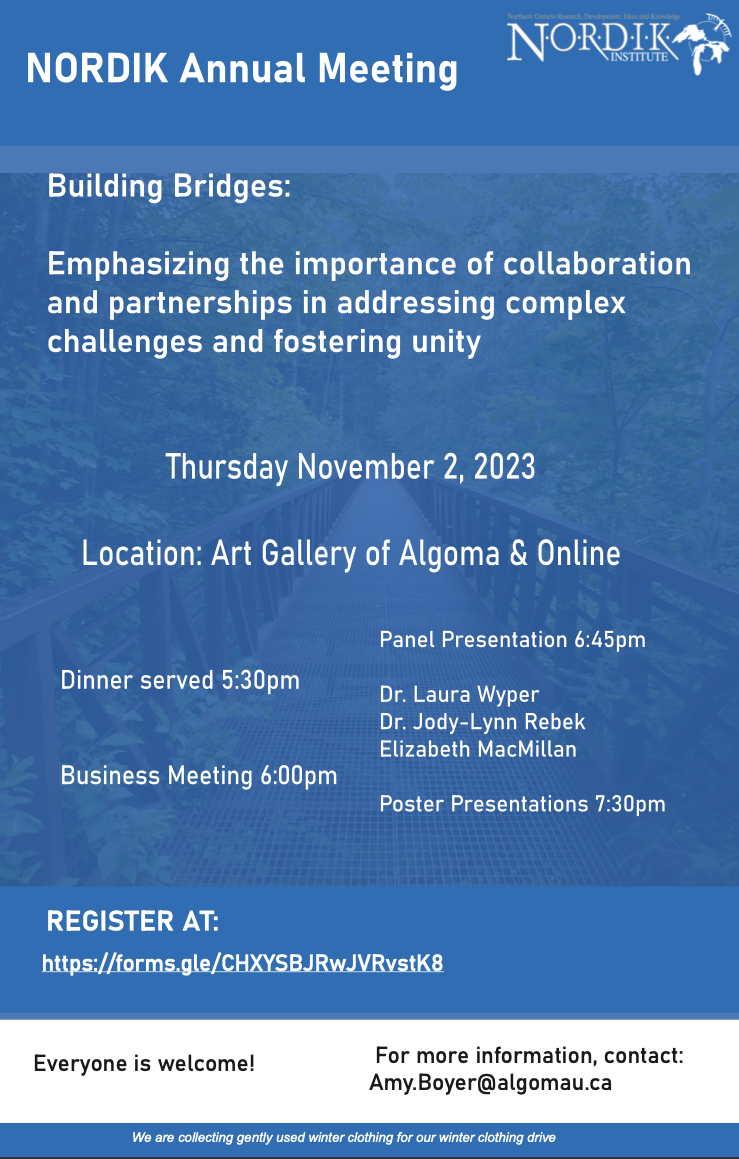
The Women Entrepreneurial Strategy (WES) has provided important investment in women who have business aspirations. The recent WES-funded report, The State of Women Entrepreneurship in Canada indicates that overall, many of the current offerings do not meet the needs of women, in general, and diverse women in particular. They also note that the majority of ‘mainstream’ business organizations’ offerings that are targeting equity-seeking founders are of limited utility as these organizations have not embraced policies and processes in overcoming systemic barriers within their operations.
The Women of Ontario Social Enterprise Network’s (WOSEN) answered the call for the development of effective women’s entrepreneurial supports by redesigning the ecosystem’s approach to creating and delivering programming and services while supporting organizations in moving towards centring equity. The project’s final report, Investing in Women Entrepreneurs: A case study for co-creating effective supports provides the sector with evidence-informed processes on ‘how to’ develop an equity-centric social entrepreneurship ecosystem. The initiative is contextualized within systems change and community economic development principles, offering a critical analysis of ways of effectively building, enhancing and expanding equity, and ‘how well’ strategies work — the impact and responses in addressing systemic barriers diverse women entrepreneurs encounter.
Dr. Jude Ortiz, NORDIK Institute’s Research Coordinator who led the Developmental Evaluation component of the project states, “WOSEN was intentionally grounded in a framework of equity-centred collaboration, principles-focused evaluation and social impact measurement. It engaged founders and ecosystem supporters in dynamic, collaborative and co-creative approaches that shifted mindsets, and built trust and capacity for investing in effective supports for women founders.”
WOSEN’s work reveals the significant role collaborative and co-creative processes contribute to building trust, shifting mindsets and identifying innovative equity-centred pathways forward. It illustrates ‘how to’:
WOSEN partners consider their collaborative and responsive approach a case study of a successful model for investing in women and creating the entrepreneurial infrastructure for them to prosper. They suggest that this model could be scaled to support others in advancing equity by building new paradigm capacity such as co-leadership, co-creation and emergent, reflective and participatory practices in developing resources, networks and pathways forward.
The collaborative supported 1,175 participants, residing in over 142 urban, rural and First Nation communities across Ontario and assisted women founders in unlocking $8.8 million dollars. WOSEN focused on women who have business solutions that put people and the planet first (i.e. social enterprises), and specifically those who were Indigenous, living in rural or remote regions, racialized, immigrants and/or living with disabilities. ‘Women’ includes genderqueer, two spirited, women-identifying individuals, and non-binary and gender non-conforming people. The terms ‘founders’ and ‘entrepreneurs’ included women who own or operate a small-medium sized business (SME) and those who are self-employed.
The report provides an overview of the key elements of each of the three catalyzing strategies for co-creating effective supports for diverse women entrepreneurs. Ten recommendations are presented for increasing investments in women founders through equity-centred collaboratives, partnerships and advocacy, and program diversity, flexibility and duration, to name a few.
WOSEN was a province-wide collaborative composed of five social innovation and system change organizations led by Pillar Nonprofit Network in partnership with NORDIK Institute, Social Innovation Canada, Social Venture Connexion and Flourishing Startups. WOSEN was funded in part by the Government of Canada through the Federal Economic Development Agency for Southern Ontario (FedDev Ontario).
Investing in Women Entrepreneurs is WOSEN’s third publication capturing the initiative’s collaborative learnings and impact. The first report, Outstanding By Standing Together, the Interim Report is available here, and the second report Centring Equity: Catalyzing system change through a collaborative, cogenerating knowledge network is available here.
To learn more about WOSEN, please visit https://wosen.pillarnonprofit.ca/.
The Children of Shingwauk Alumni Association (CSAA) is preparing for its Annual Gathering from August 4th – 7th, 2023. This year’s theme is Celebrating Our Footsteps: Our Journey. It will be a celebration of the milestones of the CSAA and Survivors, and sharing a vision for the future.
An open mic night is included, so feel welcome to bring your guitar, drum, favourite song to sing, or another special gift with our guests!
Travel reimbursement is available for alumni and family, as well as accommodation and meals provided throughout the Gathering.
Would you like to attend the event? Please register here.
Would you like to lend your time? To volunteer at this year’s Gathering, please contact Amy at amy.boyer@algomau.ca.
Would you like to sponsor or donate to the event? To offer your support, please contact Elaine at elaine.hotassone@algomau.ca.
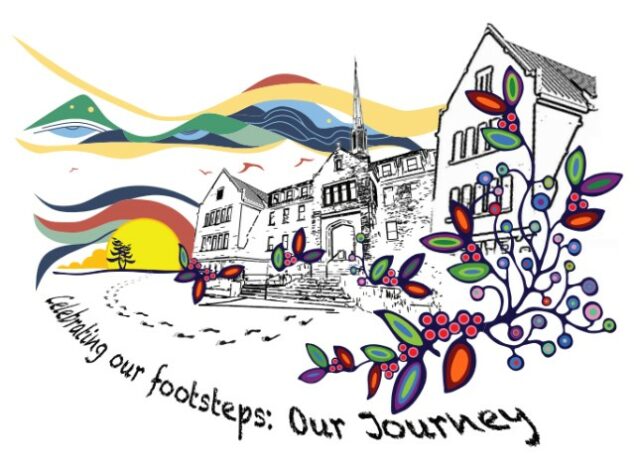
NORDIK Institute is pleased to announce its program Aki Kikinomakaywin (Learning on the Land) is returning for a second year.
The program is proudly Indigenous-led and is grounded in Anishinaabe teachings, stories, and ceremony. Through weaving Indigenous and Western ways of knowing, Aki Kikinomakaywin offers hands-on and land-based science, technology, engineering, arts, and math (STEAM) training for Indigenous youth.
In 2022, Aki Kikinomakaywin brought together 30 youth from 14 First Nation communities across Northwestern and Northeastern Ontario. Organizers are excited to offer programming again this summer thanks to the continued support from our partners and funders like NSERC PromoScience and Laidlaw Indigenous Youth and Community Futures Fund Grant.
Aki Kikinomakaywin will run for one week from July 16-22 at Lakehead University in Thunder Bay. It is free to Indigenous youth from across Northwestern and Northeastern Ontario ages 14-16 and covers all costs for accommodation, transportation, and food. The goal for future years is to run programs in both Thunder Bay and Sault Ste Marie, Ontario.
Youth participating in the program engage with local Elders and Knowledge Keepers to learn about a wide variety of topics while connecting to land, water, spirit, and self. Water teachings and governance will be a major focus of the week, including conducting an Indigenous stream assessment led by partners from Water First and participating in a water walk ceremony led by local Water Walkers. The fun-filled and educational week will be rooted in cultural teachings, camaraderie and confidence building in university and college settings.
“We all come from water, we are made of water! Water is Life! Without water, there is no life! Our original instructions are to protect and care for both the water and our Mother Earth for this generation and future generations to come,” said Sheila DeCorte, Elder Advisor, Water Walker, and member of Fort William First Nation.
This program is developed and led by Lydia Johnson, the Project Lead; Clifford Mushquash, the Mental Wellness Lead; and Haley MacLeod, the Project Supervisor, alongside Elder Advisors and Knowledge Keepers Sheila DeCorte (Fort William First Nation) and Sharon Manitowabi (Wikwemikong First Nation).
Aki Kikinomakaywin is also supported by an Indigenous Advisory Group led by Marnie Yourchuk, Education Program Manager at Mamaweswen, The North Shore Tribal Council; Lisa Harris, Coordinator of the Niijii Indigenous Mentorship program at Lakehead University; Mary Wabano-McKay, Vice-President Nyaagaaniid, Anishinabe Initiatives, Equity and Student Success at Algoma University; Carolyn Hepburn, Dean of Indigenous Studies and Academic Upgrading at Sault College; and Amanda Misnakoshkang, Geomatics Intern at Four Rivers Matawa Environmental Services Group.
Dr. Gayle Broad, Professor Emerita at Algoma University and Research Associate at NORDIK Institute, has had an integral role in developing the program.
Aki Kikinomakaywin is also fortunate to be partnering with Water First and Let’s Talk Science to provide engaging water-focused and hands-on Western science activities.
“I feel honoured to get to play a part in the Aki Kikinomakaywin Program. As a young person, opportunities to learn about how Indigenous and Western ways of knowing could be used together were not accessible to me. Being able to help provide that opportunity for Indigenous youth in Northern Ontario is very special,” said Lydia Johnson, Project Lead.
“What I really enjoy about the camp is the opportunity to learn science from both Western and Indigenous ways of knowing by doing. Having spent a lot of time in academia while (re)learning and (re)discovering my Indigenous identity and the knowledge our culture has to offer, I see this opportunity as invaluable for those who participate. That we can offer such an experience to our youth to learn about themselves and science, and motivate them to consider their future learning pathways is incredibly exciting,” said Clifford Mushquash, Mental Wellness Lead.
Applications and additional information are available on the program’s website at www.akikikinomakaywin.com.
NORDIK Institute is excited to support Aki Kikinomakaywin. The program will benefit Indigenous youth in northern Ontario by providing them with unique learning opportunities and a model for future land-based learning in the region.
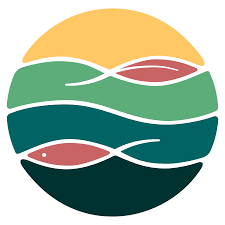
Annual General Meeting 2022
NORDIK Institute’s Annual General Meeting is taking place on Wednesday November 2, 2022 at Shingwauk Kinoomaage Gamig. Starting with a student & young scholar’s panel at 4pm followed by the business meeting at 5:30pm. The panel will feature three of NORDIK’s summer students and interns – Laura Howson, Katja Karhi, and Samantha Recollet – reflecting on their experiences working in applied research and how it shapes their educational journey.
Location: Shingwauk Kinoomaage Gaming (Circle Classroom & Gathering Place), 1491 Queen St. E. & online
Date: Wednesday November 2, 2022
Agenda
4:00 p.m.: Student Panel
5:30 p.m.: Business Meeting
NOTICE OF MOTION
WHEREAS the terms of the new Memorandum of Agreement with Algoma University stipulate new terms for the appointment of representatives to the Board of Directors of NORDIK Institute; and
WHEREAS acceptable and conventional terminology has changed since the initial drafting of the By-Laws; and
WHEREAS practical divisions of labour and executive positions have changed within both Algoma University and NORDIK since the initial drafting of the By-Laws.
THEREFORE BE IT RESOLVED THAT the following changes to the By-Laws of NORDIK Institute be adopted and come into force:
Note: Proposed changes are underlined.
|
Change from: |
|
5. MEMBERSHIP: Membership in the Corporation is open to any individual over the age of sixteen (16) years and a resident in Ontario, who supports the Purpose and Mission Statement of the organization as outlined in No. 4 above. Membership application forms may be obtained directly from the Secretary of the organization at any time, or at the Annual General Meeting. |
|
Change to: |
|
5. MEMBERSHIP: Membership in the Corporation is open to any individual over the age of sixteen (16) years and a resident in Ontario, who supports the Purpose and Mission Statement of the organization as outlined in No. 4 above. Membership application forms may be obtained directly from the website or the Director of Operations of the organization at any time, or at the Annual General Meeting. |
|
Change from: |
|
9. BOARD OF DIRECTORS: (a) The affairs of the Corporation shall be managed by a Board of Directors consisting of seven (7) members, each having one (1) vote. At least three (3) of these positions will be filled by people of Aboriginal ancestry. (b) One must be a member of the Corporation for a minimum of thirty (30) days before applying for membership on the Board of Directors. (c) Four (4) Directors shall constitute a quorum (d) Five (5) Directors shall be elected by a majority of the members present at the Annual General Meeting. (e) Two (2) Directors shall be appointed by Algoma University. One Appointee shall be the Academic Dean or his/her designate, and one Appointee shall be a member of the Board of Governors. (f) Subject to any interim provisions in this By-Law, the Directors shall serve for a term of two (2) years. (g) Board membership shall be limited to three (3) consecutive terms. The terms of Directors shall commence following their election. (h) The qualifications for a Director shall be that they are a member in good standing of the Corporation and not less than eighteen (18) years of age. (i) The office of a Director shall automatically be vacated if: by notice in writing to the Board of Directors, they resign their office; at any General Meeting, a two thirds (2/3) majority of the members present decide that they shall be removed from office; the Director fails to attend three (3) consecutive meetings without notifying the Directors; if the Directors determine that a Director has been excessively absent or has conducted themselves in a manner which is detrimental to the Corporation, provided that if any vacancies shall occur for any reason prior to an annual General Meeting, the Directors may, by resolution, fill the vacancy with any person who could qualify as a Director at an Annual General Meeting. The person so chosen shall hold office (subject to the aforementioned provisions) until the next Annual General Meeting. At that time, they may stand for election for the remainder of the vacated term. The completion of a vacated term constitutes a full term for the purposes of 9.(e) of this By-Law. (j) No Director shall be an employee of the Corporation. |
|
Change to: |
|
9. BOARD OF DIRECTORS: (a) The affairs of the Corporation shall be managed by a Board of Directors consisting of seven (7) members, each having one (1) vote. At least three (3) of these positions will be filled by people of Indigenous ancestry. (b) One must be a member of the Corporation for a minimum of thirty (30) days before applying for membership on the Board of Directors. (c) Four (4) Board Directors shall constitute a quorum (d) Four (4) Board Directors shall be elected by a majority of the members present at the Annual General Meeting. (e) Three (3) Board Directors shall be appointed by Algoma University. One Appointee shall be the Vice-President Academic & Research or his/her designate, one appointee shall be the Vice-President Operations and Finance or her/his designate, and one Appointee shall be the President of the University or her/his designate. (f) Subject to any interim provisions in this By-Law, the Board Directors shall serve for a term of two (2) years. (g) Board membership shall be limited to three (3) consecutive terms. The terms of Board Directors shall commence following their election. (h) The qualifications for a Board Director shall be that they are a member in good standing of the Corporation and not less than eighteen (18) years of age. (i) The office of a Board Director shall automatically be vacated if: by notice in writing to the Board of Directors, they resign their office; at any General Meeting, a two thirds (2/3) majority of the members present decide that they shall be removed from office; the Board Director fails to attend three (3) consecutive meetings without notifying the Board of Directors; if the Board of Directors determine that a Board Director has been excessively absent or has conducted themselves in a manner which is detrimental to the Corporation, provided that if any vacancies shall occur for any reason prior to an annual General Meeting, the Board of Directors may, by resolution, fill the vacancy with any person who could qualify as a Board Director at an Annual General Meeting. The person so chosen shall hold office (subject to the aforementioned provisions) until the next Annual General Meeting. At that time, they may stand for election for the remainder of the vacated term. The completion of a vacated term constitutes a full term for the purposes of 9.(e) of this By-Law. (j) No Board Director shall be an employee of the Corporation. |
For online participation register here .
For more information please contact: Amy Boyer at amy.boyer@algomau.ca
NORDIK Institute invites you to check out the Shingwauk Site Search Newsletter. In this first issue meet the Site Search team, find highlights from the 2022 Children of Shingwauk Alumni Association Gathering, and upcoming event announcements. It also includes the agenda of events for the National Day for Truth and Reconciliation: Orange Shirt Day on September 30th on the Algoma University – Sault Ste. Marie campus. Click Site Search Team News to read.
On September 30, 2022, NORDIK Institute will honour Residential school survivors, their families and communities by recognizing the National Day for Truth and Reconciliation: Orange Shirt Day. NORDIK Institute offices will be closed for the day to allow for our staff to take part in the events being held by Algoma University, virtually and on- campus.
The Sault Ste.Marie campus of Algoma University is hosting a full day of events. Beginning with a sunrise ceremony, flag raising, drop-in sharing circles with elder-in-residence Barbara Nolan, and in-person and virtual tours of the Shingwauk site. Some highlights include, the keynote speaker George Diamond, Project of Hearts community art activity, and a panel discussion on the Healing of Intergenerational Trauma. Concluding with the virtual Ontario Heritage Plaque unveiling, and drumming and round dance on the front lawn of the university. Find the full agenda here.
Shingwauk Kinoomaage Gamig’s Grand Opening is also happening on September 30th, beginning with a sunrise ceremony at 7:30 a.m. and official welcome at 9 a.m., and activities concluding by 4:30 p.m.. Find more information about this event here.
In a follow-up to the June visit of Indigenous and Afro-Colombian leaders to Ottawa and Northern Ontario, including a visit to Algoma University and Shingwauk Kinomaage Gamig, a delegation of Indigenous and Afro-Canadian leaders as well as allied counterparts and victims of the Colombian armed conflict exiled to Canada, was invited to the inauguration of President Gustavo Petro and Vice President Francia Marquez in Bogotá. The inauguration took place on August 7, 2022 and the Canadian delegation was invited on behalf of the Vice President, Francia Marquez.
While in Bogota, the delegation participated in a gathering at the residence of the Canadian Ambassador Marianick Tremblay, together with the visiting Parliamentary Secretary to the Minister of Foreign Affairs Maninder Sidhu, members of the Ethnic Commission for Peace and Defense of Territorial Rights. Delegates also met with Indigenous and Afro-Colombian members of the incoming government, including the new Ambassador to the United Nations, Leonor Salabata, a recognized Indigenous leader from the Arhuaca Nation. The delegation also participated in activities related to historical reparations for Black and Indigenous peoples as well as a meeting directed at building international solidarity hosted by both The Global Network – Ethnic People’s and Peace and The Black Alliance for Peace. Meetings centred on how Black and Indigenous peoples globally can work to strengthen direct governance and economic relationships among peoples, address critical issues such as poverty, land rights and climate change, and broaden spaces for dialogue and action in order to support efforts of the incoming government. The inauguration itself was an incredible testament to the power of social movements in the country who mobilized in an intensive effort to elect the Petro-Marquez formula, in a historic shift from an elitist government and policies that left rural, Indigenous and Afro-Colombian communities and territories in conditions of ongoing poverty and marginalization, displacement and violence directed against them. Today there is real hope for change.
Members of this Canadian delegation included Dr. Sheila Gruner Associate Professor at Algoma University, Chief Dean Sayers of Batchewana First Nation, Meredith Preston McGhie Secretary General of the Global Center for Pluralism, John Adeyefa President of the African Canadian Association of Ottawa (ACAO), Sahada Alolo Community Engagement Manager with the Multifaith Housing Initiative and member of ACAO, Godlove Ngwafusi Director, Equity and Anti-Racism Committee of the African Canadian Association of Ottawa, Pilar Riaño Professor of Social Justice at the University of British Columbia, Elizabeth Garcia Indigenous (Arhuaca) lawyer, researcher, social leader, and exiled victim of the armed conflict as well as other victims of the Colombian armed conflict exiled to Canada.
Chief Sayers had this to say upon reflection of his experience “I’m looking forward to continuing to work at this level on a Nation-to-Nation basis. This international exposure can only enhance the work that we’re doing on our lands here in proximity to Lake Superior with the Canadian and Ontario governments.”
“This visit meant for me the meeting of my two worlds”, began Elizabeth when thinking of what the delegation to Colombia meant for her. “There is certainty that there are no borders for solidarity and alliance building between peoples” (quote translated to English).
Professor Sheila Gruner emphasized the many parallels between Indigneous and Afrodiasporic thought and ways of being across the Americas, including the emphasis on “living well” with the Earth, within and across societies, reflected in a concept that the incoming Vice President articulated in her campaign as “vivir sabroso” (living well and enjoying life- until “dignity becomes the norm”) and “Ubuntu” (I am because we are). “There is a beautiful opportunity here related to reorienting the relationship between Canada and Colombia to emphasize what Algoma University has committed to, in way of decolonization, indigenization and diversity.”
Based on ongoing efforts to generate spaces for effective exchange between and among Indigenous, Afrodescendant and allied faculty and other counterparts, there will be an emphasis on higher education for communities historically marginalized and establishing routes to constructing a “complete peace” in Colombia. Algoma University, Shingwauk Kinomaage Gamig, NORDIK Institute and the new Faculty of Cross Cultural Studies have been invited to continue building in these areas.
For more information on the delegation or the work being done by those associated with the delegation, please contact/visit the following people/websites below:
Dr. Sheila Gruner – sheila.gruner@algomau.ca
The Global Network – https://nordikinstitute.com/research/ethnic-peoples-peace-global-network/
Shingwauk Kinomaage Gamig – https://shingwauku.org/
Batchewana First Nation – https://batchewana.ca/
The Global Network Ethnic Peoples and Peace Canadian Delegation along with Marianick Tremblay (Ambassador of Canada in Colombia) at the Presidential Inauguration
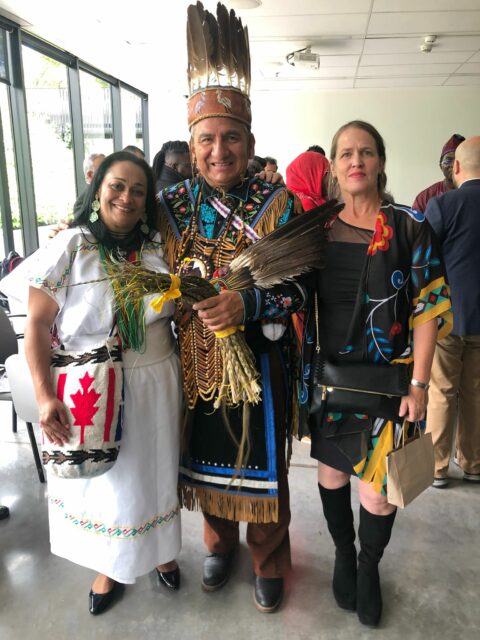
From Left to Right: John Adeyafa – President of the African Canadian Association of Ottawa (ACAO), Ingrid Garcia – Coordinator for the Canadian Chapter of the International Victims’ Forum, member of International Women for Peace and “We Defend the Peace”, Marianick Tremblay, Chief Dean Sayers of Batchewana First Nation, Meredith Preston McGhie – Secretary General of the Global Center for Pluralism, Elizabeth Garcia – Indigenous (Arhuaca) Lawyer, Dr. Sheila Gruner – Chair, Faculty of Cross Cultural Studies, Algoma University and Global Network, Sahada Alolo – ACAO, Godlove Ngwafusi – Director, Equity and Anti-Racism Committee of ACAO
Morning Prep for Inauguration
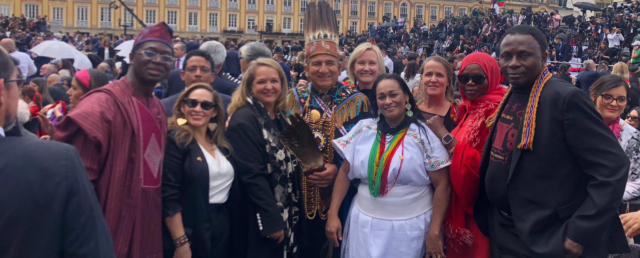
From Left to Right: Elizabeth Garcia, Chief Dean Sayers, and Dr. Sheila Gruner
Dr. Jude Ortiz of NORDIK Institute joins the International Advisory Board for a new project on cultural and creative industries in non-urban areas of the EU
Longstanding researcher with the NORDIK Institute, Dr. Jude Ortiz, has joined the International Advisory Board for a new major project exploring cultural and creative industries in Europe. The project “IN SITU – Place-based innovation of cultural and creative industries in non-urban areas” was launched on July 1, 2022, with a 48-month duration. Coordinated by the Centre for Social Studies at the University of Coimbra, Portugal, the €4 million project is funded by the European Commission under the Horizon Europe programme.
Despite the increased visibility and importance of cultural and creative industries (CCIs) based in non-urban areas of the European Union in the last decade, there is a noticeable lack of research and policy attention to their specific needs, characteristics, and potential. IN SITU brings together leading research approaches to economic evolution and diversification, processes of innovation, non-urban place-based planning, and entrepreneurship in CCIs. The project aims to contribute to increasing the capacity of CCIs to act as drivers of innovation, competitiveness, and sustainability in their local context.
IN SITU seeks to provide in-depth knowledge on the effects of cross-sectoral connections, innovative strategies and systems, and the needs of CCIs’ practitioners in non-urban areas, complementing this with proposals for cultural and innovation policies and frameworks. IN SITU includes also capacity-building programme to enable CCIs to address some of the key issues in their communities/regions.
The core defining aspect of IN SITU is the interlinking of research and practice through place-based IN SITU Labs – hubs for networking, capacity building, and monitoring case studies in six non-urban regions across Europe, located in Portugal, Ireland, Iceland, Finland, Latvia, and Croatia.
The project brings together 13 institutional partners in 12 countries: the Centre for Social Studies of the University of Coimbra (coordinator); National University of Ireland Galway (Ireland); European Network of Cultural Centres (Belgium); Utrecht University (Netherlands); National Institute for Agriculture, Food and Environment (France); MONDRAGON Innovation & Knowledge (Spain); Kultura Nova Foundation (Croatia); University of the Azores (Portugal); University of Turku (Finland); Latvian Academy of Culture (Latvia); Bifröst University (Iceland); National Academy of Theatre and Film Arts “Kr. Sarafov” (Bulgaria); and University of Hildesheim (Germany).The IN SITU project is also accompanied by an array of Outreach Partners within Europe and internationally: Culture Action Europe, DigitalMeetsCulture.eu, EMES – Research Network for Social Enterprise, Creative Scotland, United Cities and Local Governments – Committee on Culture, Cultural Development Network (Australia), Creative City Network of Canada, SPARC: Supporting Performing Arts in Rural and Remote Communities (Canada), and Sustaining Theatre and Dance (STAND) Foundation (South Africa).
In addition, the project has an International Advisory Board of seven leading international experts working on CCIs and culture-based work in non-urban areas. In addition to Dr. Ortiz, Algoma University, representing Canada, these experts include : Chris R. Gibson, University of Wollongong (Australia); Susan Luckman, University of South Australia (Australia); Avril Joffe, University of the Witwatersrand (South Africa); Patrick Brouder, Vancouver Island University (Canada); Tim Wojan, Oak Ridge Institute for Science and Education (ORISE) and National Science Foundation (United States); and Sylvia Amann, Inforelais (Austria).
For further information, please contact Nancy Duxbury (IN SITU Principal Investigator, Centre of Social Studies, University of Coimbra, Portugal) at duxbury@ces.uc.pt.
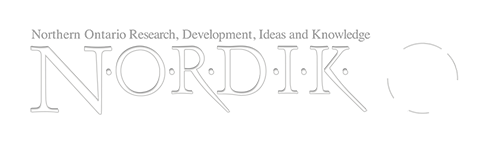
1520 Queen St. East
Sault Ste. Marie
P6A 2G4
Copyright © 2021. NORDIK Institute. Privacy Policy